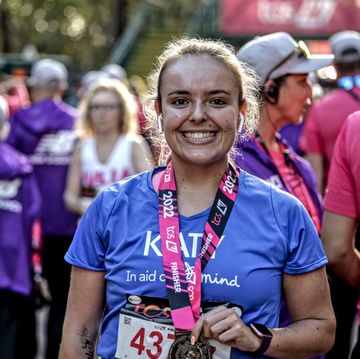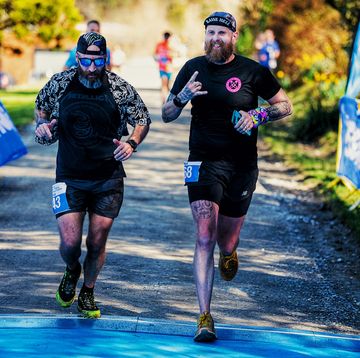The feeling of crossing a marathon finish line is completely unmatchable. You’ve spent the last six months training tirelessly, day after day, to achieve this tremendous feat – and now you’ve done it. You’re elated and exhausted, and perhaps the proudest you’ve ever felt…
But after an evening of celebrations and the following days spent showing off your medal to your colleagues, what happens next?
Well, you might start to feel a bit flat – it’s known as the post-marathon blues. ‘Whatever the distance of the race, if you have trained hard for it and it was important to you, then once it physically ends you might have a psychological hangover in the shape of post-race blues,’ explains sport psychologist Josephine Perry, director of Performance in Mind. ‘These usually pop-up mid-week when the euphoria of finishing and the post-race DOMs starts to subside, and you get a dip in mood.’
And it doesn’t just happen to amateur runners. ‘Working in high-performance, or the military, it’s expected. We know that as you go through such pain and intense emotions, it’s perfectly normal to have that afterwards,’ explains consultant psychiatrist and sports psychiatrist for ASICS Europe Dr Amit D Mistry, who works with elite athletes, as well as private patients at his Outpatient clinic at the Nightingale Hospital, central London.
It’s well documented that, following the Olympics, athletes often struggle with their mental health. Olympic swimmer Michael Phelps is one athlete who has spoken openly about experiencing depression coming back from the Olympic Games in 2004 and 2008. ‘If you’re thinking about elite sport pre-competition training, athletes do become quite regimented as this is functional for them in their unique circumstance – they're thinking about performance metrics, training, how they eat,’ explains Mistry. ‘And then when you step away from performance, or competition, or just training, that’s quite hard, because you’ve been really focused on something for a long time. And that can be quite a shock.’
With much more spare time on your hands, you might also feel that your days lack structure – and that you’ve lost your sense of purpose – leaving a bit of a void that somehow needs filling.
What causes the post-marathon blues?
There’s a number of factors that can help to explain this feeling of emotional flatness following a marathon – biological, psychological and socio-environmental.
In terms of our biology, we know that, when we exercise, our body releases chemicals called endorphins – these behave a lot like morphine, as they can reduce your perception of pain and trigger feelings of positivity and pleasure. Our body also pumps out substances called endocannabinoids, such as anandamide, which is believed to create a feeling of calmness.
It makes sense, then, that if when we reduce our training dramatically once our race is over, the absence of such high levels of these chemicals in our bodies might result in a dip in mood – or even increased anxiety. ‘There’s a really fascinating study that was done quite a few years ago, and that looked at people who were regularly doing physical activity. They essentially just stopped people from exercising. And what they saw was a huge rebound in depressive symptoms and anxiety,’ says Mistry.
The psychological impact of no longer training for a race relates to things like our self-esteem, too. ‘If we think about the psychosocial aspect, there is something about getting good at an activity,’ says Mistry. ‘There is something about the mastery and it boosting your self-esteem, and also the social aspect. If you’re training you tend to be socialised. And if you take that away from somebody, you’ve lost a huge component – that biopsychosocial type setup.’
When we’re training for an event, we’re also rewarded with a regular feeling of accomplishment, as we tick off training sessions from our plans and see our running fitness improve – and the resulting mood lift, in part, comes down to our biology. A chemical called dopamine spikes when something good happens – be it a small ‘win’ like nailing a training session or something bigger like getting a promotion at work or buying a new house. Like endorphins, dopamine is another neurotransmitter, which boosts feelings of positivity. It also spikes when we exercise as well when we set a goal for ourselves – and get close to achieving them – for example, signing up to – and running – a marathon.
The withdrawal from dopamine in the days following the event could also help explain our drop in mood. ‘Dopamine is linked to our internal reward system called the mesolimbic pathway,’ says Mistry. ‘It can be a positive thing, but it can be a double-edged sword as it can be highly addictive. However, for the majority of society, exercise is brilliant, it’s just in rarer cases, it could become a problem in terms of addiction.’
How long do the post-marathon blues last?
According to both Mistry and Perry, the post-marathon blues don’t last for too long and aren’t anything to worry about. ‘It usually clears up pretty quickly and there are lots of things we can do to make ourselves feel better,’ says Perry. ‘Most people find it only lasts a few days.’
During this time, try speaking to someone you can chat to in psychological safely about how you’re feeling. ‘It is important that you have someone you completely trust and know are on your side,’ says Perry. ‘A sports psych is brilliant for this. If this isn’t in your budget, try a really good friend, family member or someone from your sports club that you feel able to chat with and you know won’t spread gossip.’
If you’re still feeling low in mood after two weeks for most of the day and early everyday, Mistry advises seeking help in the form of your GP a mental health professional, as this may indicate something more serious. ‘At this point, we would assess mood rating, energy levels, motivation, sleep habits, concentration levels, appetite – and whether someone still finds pleasure in the hobbies that they’re doing. This will then be reviewed on how this is impacting on daily function. In extreme circumstances, people may feel suicidal. These are the typical symptoms we would look at when diagnosing depression. We may also assess patients in clinic for overtraining syndrome or RED-S (relative energy deficiency in sport), which can very closely mimic, and overlap with, depressive symptoms.’
However, in most cases, the post-marathon blues will resolve by itself, reassures Mistry. ‘It’s perfectly normal and, more often than not, will get better by itself.’
What can I do to make myself feel better?
In the immediate aftermath after your race, Mistry recommends doing a ‘hot debrief’, where you 'lightly' write down all things you can take away from the race – so what went well and what didn’t. Then, take some time away from running to give yourself time to process your marathon, before debriefing on the race again at a later date. ‘That’s the process we commonly see in high-performance sport – an example would be in Olympic cycles – many institutions have followed that model and that’s derived from military type interventions and medical-type settings.’
Perry agrees that it’s important to take some time away from training, so resist the urge to jump into signing up for another race right away. ‘You need time to both mentally and physically rest and recover,’ she explains. ‘You may also need to earn back some brownie points from loved ones for the single-mindedness you have needed to have in the marathon build up. Now is the time to support others for a few weeks in their endeavours. But longer term, do have another race or challenge planned so you can focus your attention and efforts again.’
That said, it's a good idea to get some plans in the diary for after your marathon, so you know where you are going to focus your attention once the race is over. ‘It could be a holiday or trying out a different sport for a few weeks, goal setting – to work on what you want to achieve next – or giving time back to those who have supported you recently,’ says Perry.
She also recommends maintaining the connections you may have made throughout your marathon training journey – be it via running clubs or running friends you have made on social media. ‘Having a sense of belonging to the sport we do and the community we interact with is incredibly important for motivation,’ she says.
After taking a break, you’re then more likely to be able to view your race more objectively. ‘It’s after we’ve processed emotions that we can get objective,’ says Mistry. ‘So then you can really look at the stats, and your performance, and how can you could do things differently next time.’
If you miss doing physical activity, build some light cross training into your days but avoid running for at least five to six days post race, advises running coach Sam Murphy. At this point, she recommends trying a ‘test’ run of 20-30 minutes, observing any enduring aches or pains.
However, she warns that it’s important not to jump straight back into your running routine, as this will only increase your injury risk. ‘Burn off your excess energy with one or two weeks of light cross training,’ advises Murphy. ‘Swim, cycle, use the elliptical or do other low-impact activities every other day for the same amount of time you would otherwise spend running. If you experience any soreness, minor aches or fatigue, take a few days off and rest.’













